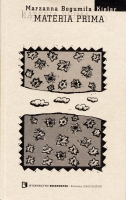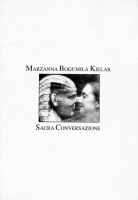Marzanna B. Kielar
John Taylor: "Salt Monody by Marzanna Kielar" [in:] Absinthe: New European Writing 8. USA 2007, s. 112-115
Marzanna Kielar's poetry first caught my eye in "Carnivorous Boy, Carnivorous Bird", an anthology of younger Polish poets that Zephyr brought out in 2004.Now this inquisitive and resourceful small press, focused on Russian and Eastern European literature, has published a first selection of Kielar's sensuous and deep-probing verse. As in the anthology, Elżbieta Wójcik-Leese has provided an engaging translation.
"Salt Monody" draws on Kielar's three Polish collections, "Sacra conversazione" (1992), "Materia prima" (1999), and "Monodia" (2006). These titles announce the philosophical range of her work, as well as its aspiration to an unusual kind of poetic, even musical, grace. Indeed, the musical sense of "monody" as a single solo line describes the structure of many poems, often composed of one, two, or just a few long sentences which, through colons, semi-colons, dashes, enjambments, stark juxtapositions, and lines of irregular length, gradually unfold their multiple meanings and implications.
Kielar's poems are set in the windy, woody, lake-speckled Baltic hinterland and seascapes of her native Mazuria, a region of northern Poland. (She was born in Gołdap in 1963). She conjures up this particular geography and its climes extremely well, as the first lines of the first poem immediately show:
enormous sea - as far as the dunes, with its lips
ever against the skin of wind, as if against the other
half of its being; steep,
empty saddles of waves, touched by the light
which already turns back, slips out leaving behind
the dimming seam.
However, for all the beauty of her evocations, Kielar above all ventures behind natural phenomena and questions the perceiver's relationship to them. She charts subjectivity's grappling with that from which it is logically separated. In this regard, her poetry pinpoints impassable gaps, but also and especially searches for hidden unifying principles and unexpected intersections of Nature (or the Other) and individual experience. Sometimes descriptions of natural settings ("boughs thickset with white and dark pink, / with the hum of bees") strangely transmute into a human encounter. "Your hand in my hair, on my neck, gently, / softly," she continues, for instance. "All its fragility (and quiver?). / The nakedness of opening leaves, thickening / green, fingers slipping off the dress-strap." Characteristically, delicate eroticism blends here with movements within Nature, and vice versa. Other poems lament - another sense of monody - lost love, death, and various disunions. The nightmarish "Pre-existences", apparently about a miscarriage or a stillborn baby, provides an unforgettable example. Kielar's earlier title, "Materia prima", is also telltale. Sometimes the "materia prima" that the poet senses in herself, or outside her body, resembles a vital energy, as in the lines "the silence inside me: not even a bird sings // only fire." In "The Hawk," she makes this explicit alignment: "blood, materia prima." Here and in other poems, she thus revolves around that elusive concept, "life," which as a "materia prima" has proven harder to define for philosophers than it may appear. In another important piece, this life-engendering, existence-revealing, or reunifying "materia prima" is ascribed to love. "When love comes back and reminds us of our true being," she exclaims, "When it pieces together the body of the world again, anew..."
A dialectic is thereby established between disintegration and wholeness. Moreover, her poems often evolve, through sharply focused but also semantically rich word pictures, toward a lost or invisible starting point, or more precisely: toward a fundamental dynamic principle that recalls the "arkhe" that ancient Greek poet-philosophers intuited. (...)
"Salt Monody" draws on Kielar's three Polish collections, "Sacra conversazione" (1992), "Materia prima" (1999), and "Monodia" (2006). These titles announce the philosophical range of her work, as well as its aspiration to an unusual kind of poetic, even musical, grace. Indeed, the musical sense of "monody" as a single solo line describes the structure of many poems, often composed of one, two, or just a few long sentences which, through colons, semi-colons, dashes, enjambments, stark juxtapositions, and lines of irregular length, gradually unfold their multiple meanings and implications.
Kielar's poems are set in the windy, woody, lake-speckled Baltic hinterland and seascapes of her native Mazuria, a region of northern Poland. (She was born in Gołdap in 1963). She conjures up this particular geography and its climes extremely well, as the first lines of the first poem immediately show:
enormous sea - as far as the dunes, with its lips
ever against the skin of wind, as if against the other
half of its being; steep,
empty saddles of waves, touched by the light
which already turns back, slips out leaving behind
the dimming seam.
However, for all the beauty of her evocations, Kielar above all ventures behind natural phenomena and questions the perceiver's relationship to them. She charts subjectivity's grappling with that from which it is logically separated. In this regard, her poetry pinpoints impassable gaps, but also and especially searches for hidden unifying principles and unexpected intersections of Nature (or the Other) and individual experience. Sometimes descriptions of natural settings ("boughs thickset with white and dark pink, / with the hum of bees") strangely transmute into a human encounter. "Your hand in my hair, on my neck, gently, / softly," she continues, for instance. "All its fragility (and quiver?). / The nakedness of opening leaves, thickening / green, fingers slipping off the dress-strap." Characteristically, delicate eroticism blends here with movements within Nature, and vice versa. Other poems lament - another sense of monody - lost love, death, and various disunions. The nightmarish "Pre-existences", apparently about a miscarriage or a stillborn baby, provides an unforgettable example. Kielar's earlier title, "Materia prima", is also telltale. Sometimes the "materia prima" that the poet senses in herself, or outside her body, resembles a vital energy, as in the lines "the silence inside me: not even a bird sings // only fire." In "The Hawk," she makes this explicit alignment: "blood, materia prima." Here and in other poems, she thus revolves around that elusive concept, "life," which as a "materia prima" has proven harder to define for philosophers than it may appear. In another important piece, this life-engendering, existence-revealing, or reunifying "materia prima" is ascribed to love. "When love comes back and reminds us of our true being," she exclaims, "When it pieces together the body of the world again, anew..."
A dialectic is thereby established between disintegration and wholeness. Moreover, her poems often evolve, through sharply focused but also semantically rich word pictures, toward a lost or invisible starting point, or more precisely: toward a fundamental dynamic principle that recalls the "arkhe" that ancient Greek poet-philosophers intuited. (...)









